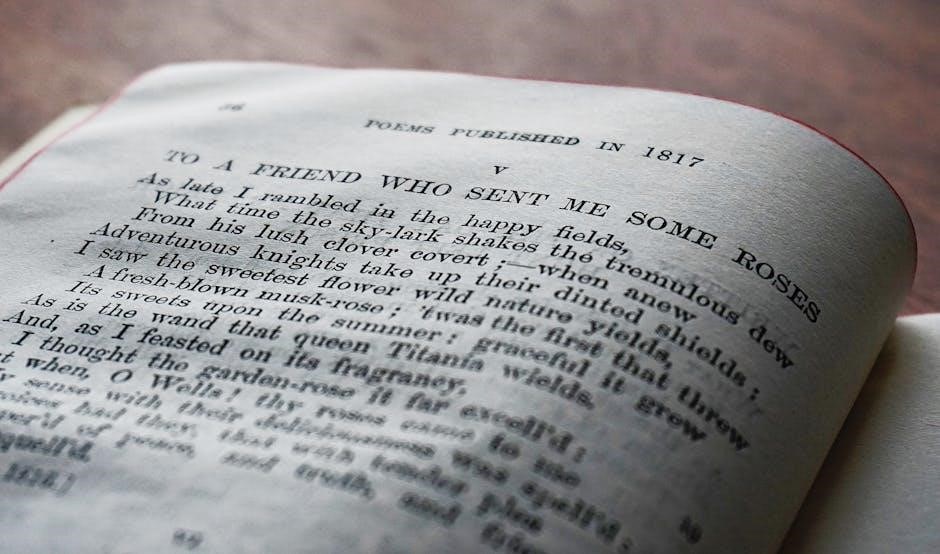
The Iliad, an ancient Greek epic poem attributed to Homer, is a cornerstone of European literature, recounting the Trojan War and Achilles’ wrath. Available in PDF, it remains a vital resource for classical studies and literary exploration.
1.1 Overview of the Iliad as a Founding Work of European Literature
The Iliad, dated to the 8th century BC, is a seminal work in European literature, attributed to Homer. It narrates the Trojan War, a pivotal event in classical mythology, and explores themes of honor, glory, and human emotion. As an epic poem, it has shaped Western literary tradition, influencing countless works. Its availability in PDF ensures accessibility, allowing modern readers to engage with this foundational text of ancient Greek literature.
1.2 Importance of the Iliad in Classical Studies
The Iliad holds a central place in classical studies, offering insights into ancient Greek culture, mythology, and society. It explores themes of honor, duty, and human nature, making it a key text for understanding the classical world. Scholars analyze its composition, attributed to Homer, and its influence on later literature. The PDF format facilitates easy access, enabling researchers and students to study this foundational epic poem in depth, enhancing academic exploration and appreciation of its historical significance.
1.3 Brief Summary of the Iliad’s Narrative
The Iliad tells the story of the final year of the Trojan War, focusing on the wrath of the Greek hero Achilles. The conflict begins with a quarrel between Achilles and Agamemnon over a woman, leading to devastating consequences. The epic explores themes of honor, pride, and mortality, while detailing the battles and interactions between mortals and gods. Available as a PDF, the poem provides a vivid account of human emotions and the legendary clash between Greeks and Trojans.

Composition and Authorship
The Iliad, composed in the 8th century BC, is attributed to Homer, drawing from oral traditions, making it a cornerstone of ancient Greek poetry.
2.1 Dating the Iliad to the 8th Century BC
The Iliad is traditionally dated to the 8th century BC, marking a pivotal shift from oral tradition to written form. This period, during early Greek literacy, captures the evolving cultural and poetic practices of the time. Scholars link its composition to the Hellenistic era’s scholarly efforts, solidifying its place in classical literature.
2.2 Attribution to Homer and Oral Sources
The Iliad is attributed to the ancient Greek poet Homer, though its origins are rooted in oral traditions. Scholars believe the poem was compiled from earlier oral sources, blending collective narratives into a cohesive epic. Homer’s role was likely that of a master poet synthesizing these tales, embedding them with poetic structure and linguistic richness that define the work’s enduring legacy in classical literature.
2.3 The Role of Homer in Ancient Greek Poetry
Homer stands as a pivotal figure in ancient Greek poetry, with works like the Iliad shaping the literary canon. His epics not only preserved historical and mythological narratives but also established a poetic style that influenced subsequent generations of writers. Homer’s mastery of dactylic hexameter and the use of similes became hallmarks of epic poetry, solidifying his legacy as a foundational figure in Western literature and culture.

Narrative and Structure
The Iliad masterfully intertwines the Trojan War’s grandeur with personal conflicts, focusing on Achilles’ wrath. Its structured narrative weaves divine intervention with human drama, creating an epic tapestry.
3.1 The Trojan War as the Central Plot
The Trojan War forms the epicenter of the Iliad, detailing the ten-year conflict between Troy and Greece. Sparked by Paris’s abduction of Helen, the war unfolds with legendary battles and divine meddling. The poem captures the final, climactic year, emphasizing honor, revenge, and fate. This historical backdrop enriches the narrative, blending myth with heroism to create an enduring tale of human and divine conflict.
3.2 Focus on Achilles’ Wrath
Achilles’ wrath is the emotional core of the Iliad, driving the narrative. His rage, sparked by Agamemnon’s seizure of Briseis, leads to his withdrawal from battle. This decision profoundly impacts the Greek army, highlighting themes of honor, pride, and vulnerability. Achilles’ character evolves, showcasing his complexity as a hero and human, making his story central to the epic’s exploration of human nature.
3.3 The Interplay Between Mortals and Deities
The Iliad vividly portrays the intricate relationship between mortals and deities, with gods like Zeus, Hera, and Athena actively influencing human affairs. Their interventions often reflect personal biases, shaping the fates of characters like Achilles and Hector. This divine-human dynamic underscores themes of fate, free will, and the human condition, enriching the epic’s exploration of power, morality, and destiny. The gods’ actions mirror and amplify the emotions and conflicts of the mortal world.
Themes and Motifs
The Iliad explores universal themes such as honor, glory, and the human condition, while motifs like fate, destiny, and emotional depth enrich its narrative complexity and timeless appeal.
4.1 Honor and Glory in Ancient Greek Culture
Honor and glory were central to ancient Greek culture, defining a warrior’s reputation and identity. In the Iliad, Homer portrays these themes through Achilles’ and Hector’s struggles, highlighting the pursuit of arete (excellence) as a driving force. The poem illustrates how honor was tied to public recognition, shaping decisions and conflicts, while glory became a lasting legacy. These themes reflect the cultural values of heroism and the human quest for immortality through deeds, making the Iliad a profound exploration of honor’s significance in ancient Greek society.
4.2 The Human Condition and Emotions in the Iliad
The Iliad deeply explores the human condition, capturing the complexity of emotions such as grief, anger, and compassion. Achilles’ rage and Hector’s fear exemplify the emotional depth of human experience. Homer vividly portrays the psychological struggles of warriors, highlighting the fragility of life and the universal quest for meaning. These emotional narratives resonate across centuries, making the Iliad a timeless reflection of human vulnerability and emotional richness.
4.3 The Concept of Fate and Destiny
The Iliad profoundly explores the concept of fate and destiny, with characters often acknowledging the inevitability of their predetermined paths. The gods, particularly Zeus, influence mortal lives, yet human agency coexists with divine will. The idea of moira (fate) underscores the tragic inevitability of events, such as Hector’s doomed defense of Troy. This interplay between fate and human choice adds depth to the narrative, highlighting the universal struggle against destiny and the human condition’s frailty.

Cultural and Historical Context
The Iliad reflects the cultural values of ancient Greece, emphasizing honor, glory, and the societal norms of the time. It also draws from the historical backdrop of the Trojan War, blending myth with history to create a vivid narrative that shaped Western literature and thought.
5.1 The Legendary Trojan War in Classical Mythology
The Trojan War, a central event in classical mythology, was sparked by the abduction of Helen by Paris, leading to a decade-long conflict between Troy and Greece. This epic clash, detailed in the Iliad, symbolizes honor, revenge, and fate, captivating audiences with its blend of heroism and divine intervention, making it a cornerstone of Western literary tradition.
5.2 The Role of Goddesses in the Iliad
Goddesses like Hera, Athena, and Aphrodite play pivotal roles in the Iliad, influencing the war’s outcome through divine interventions; Their rivalries, such as the dispute over the golden apple, drive the plot and reflect themes of jealousy and power. These deities embody human emotions on a celestial scale, shaping the fates of mortals and highlighting the interplay between divine will and human action in ancient Greek mythology.
5.3 The Influence of Ancient Greek Society on the Poem
The Iliad reflects the values and societal norms of ancient Greece, emphasizing honor, glory, and the heroism of warriors. It portrays the political and cultural dynamics of the time, with kings and leaders holding significant power. The poem also explores themes of fate and human emotion, deeply rooted in Greek philosophy and culture, offering insights into the social and ethical ideals of the era.

Style and Language
The Iliad is renowned for its poetic devices, including dactylic hexameter and vivid similes, which enhance its epic narrative. The oral tradition’s influence is evident in its rhythmic structure and repetitive phrases, creating a captivating and enduring literary style.
6.1 The Use of Dactylic Hexameter
The Iliad is composed in dactylic hexameter, a poetic meter consisting of six dactyls per line. This rhythmic structure, with its pattern of stressed and unstressed syllables, creates a grand, epic tone. Dactylic hexameter enhances the narrative’s flow and emotional depth, making it ideal for oral recitation. Its use in the Iliad underscores Homer’s mastery of poetic form, blending aesthetics with storytelling to convey the gravity of the Trojan War and the heroes’ struggles.
6.2 Similes and Their Function in the Iliad
Similes in the Iliad vividly compare heroic actions and emotions to natural phenomena, enhancing imagery and intensity. For example, likening Achilles’ rage to a raging fire or a storm intensifies his fury. These comparisons bridge the divine and human realms, making complex emotions relatable. Homer’s use of similes not only enriches the narrative but also deepens the reader’s emotional connection to the characters and their struggles, highlighting the epic’s dramatic and psychological depth.
6.3 The Oral Tradition and Its Impact on the Poem’s Style
The Iliad reflects its roots in oral tradition through repetitive epithets, rhythmic dactylic hexameter, and formulaic expressions. These elements, such as “rosy-fingered Dawn” or “swift-footed Achilles,” aided memorization and performance. The oral style also influenced the poem’s structure, with standardized scenes like battles and divine interventions. This tradition ensured the epic’s coherence and artistic appeal, making it accessible to audiences before its written form.

Major Characters
The Iliad features iconic figures like Achilles, the formidable Greek warrior, and Hector, the noble Trojan prince. Zeus and other deities also play pivotal roles, shaping the epic’s narrative and conflicts.
7.1 Achilles: The Greek Hero
Achilles, the central protagonist of the Iliad, is renowned for his extraordinary strength and martial prowess. As the son of King Peleus and the sea-nymph Thetis, he is semi-divine, with his legendary rage driving the poem’s narrative. His conflict with Agamemnon over Briseis and his subsequent withdrawal from battle highlight his pride and emotional depth. Achilles’ vulnerability, due to his famed heel, underscores his tragic humanity, making him one of literature’s most compelling heroes.
7.2 Hector: The Trojan Hero
Hector, the noble prince of Troy, embodies honor and duty, leading his city’s defense against the Greeks. As the son of King Priam and Hecuba, he is a skilled warrior and a symbol of Trojan resilience. His duel with Achilles is a defining moment, showcasing his courage and the tragic fate that awaits him. Hector’s unwavering commitment to his family and city underscores his heroic character, making him a poignant figure in the epic narrative.
7.3 The Role of Zeus and Other Deities
Zeus, as king of the gods, plays a pivotal role in the Iliad, often mediating conflicts and maintaining divine order. Other deities like Hera, Athena, and Aphrodite actively interfere in the Trojan War, reflecting their biases and rivalries. Their interventions highlight the interplay between mortals and immortals, adding layers of complexity to the narrative. Zeus’s impartiality contrasts with the partisanship of other gods, emphasizing his authority and the inevitable fate that governs both humans and deities alike in the epic tale.

Key Episodes
The Iliad features pivotal moments like the quarrel between Agamemnon and Achilles, the funeral games for Patroclus, and the fall of Troy, shaping its epic narrative and themes.
8.1 The Quarrel Between Agamemnon and Achilles
The conflict begins when Agamemnon, leader of the Greeks, seizes Achilles’ war prize, Briseis. This act of dishonor ignites Achilles’ wrath, leading to his withdrawal from the war. The quarrel highlights themes of honor, pride, and leadership, driving the narrative’s tension and character development. This episode is central to the Iliad’s exploration of human emotions and the consequences of unresolved conflict.
8.2 The Funeral Games for Patroclus
The funeral games for Patroclus, held by Achilles, showcase the deep bond between the two warriors. The games, featuring chariot races and other competitions, honor Patroclus’s memory and provide a momentary respite from the war. Achilles’ emotional struggles are evident as he distributes prizes and grapples with grief, highlighting his complexity as a character. This episode underscores the human dimension of war and the importance of camaraderie.
8.3 The Fall of Troy and Its Aftermath
The fall of Troy is indirectly anticipated in the Iliad, as the poem focuses on the events leading to the war’s climax. The ruse of the Trojan Horse, though not detailed in the text, is implied as the Greeks’ ultimate strategy. The aftermath brings devastation for Troy, with its people facing sorrow and loss, while the Greeks, though victorious, confront the cost of their triumph. The PDF format captures these themes vividly, enhancing the exploration of war’s futility and humanity’s resilience.

Historical and Cultural Impact
The Iliad has profoundly shaped Western literature, inspiring countless works and academic studies. Its themes and characters remain central to cultural discourse, while its PDF format ensures enduring accessibility.
9.1 The Iliad’s Influence on Later Literature
The Iliad has profoundly shaped Western literature, inspiring works like Virgil’s Aeneid and influencing authors from Alexander Pope to modern writers. Its themes of heroism, honor, and human conflict remain central to literary traditions. The PDF format ensures accessibility, allowing scholars and readers to explore its timeless relevance and poetic mastery, further cementing its legacy as a foundational epic in world literature.
9.2 The Role of the Iliad in Academic Studies
The Iliad is a cornerstone of classical studies, offering insights into ancient Greek culture, warfare, and societal values. Scholars analyze its narrative structure, themes, and historical context to understand the development of Western literature. The PDF format facilitates easy access for academic research, enabling detailed study of Homer’s masterpiece and its enduring relevance in literary and historical scholarship.
9.3 Adaptations and Interpretations in Modern Media
The Iliad has inspired numerous adaptations, from films to stage productions, reimagining its epic narrative for modern audiences. Digital formats, including the PDF version, have made it accessible for contemporary reinterpretations. These adaptations often emphasize universal themes like honor and conflict, ensuring the poem’s relevance across generations and mediums, while preserving its original essence for new explorations in literature and art.

The Iliad in PDF Format
The Iliad in PDF offers a convenient way to explore Homer’s epic poem, combining classic translations with modern accessibility, making it easier for readers to engage with the timeless narrative.
10.1 Availability of the Iliad as a PDF
The Iliad is widely available in PDF format, accessible through platforms like Project Gutenberg and Google Books. Editions include classic translations by A.T. Murray and Samuel Butler, often bundled with modern interpretations. This digital format allows readers to explore Homer’s masterpiece seamlessly, making it ideal for academic research and personal reading. Many versions are free for download, ensuring accessibility for a global audience interested in classical literature.
10.2 Translations and Editions of the Iliad PDF
The Iliad is available in numerous PDF translations, including A.T. Murray’s Loeb Classical Library edition and Samuel Butler’s earlier interpretation. These translations preserve Homer’s epic style while offering readability. Digital editions often include annotations, enhancing scholarly access. The Poem’s enduring appeal ensures diverse translations, catering to both academic and casual readers. This versatility makes the Iliad PDF a invaluable resource for exploring ancient Greek literature in modern formats.
10.3 Benefits of Reading the Iliad in Digital Format
Reading the Iliad in PDF offers unparalleled convenience and accessibility. Digital formats allow for easy navigation, searchable text, and annotations. Portability enables reading on multiple devices. Enhanced editions often include historical context, improving understanding. Digital versions also facilitate quick reference and comparison, benefiting scholars and enthusiasts alike. This modern approach ensures Homer’s timeless epic remains engaging and accessible for contemporary audiences.

Reception and Interpretation
Scholarly analysis of the Iliad highlights its enduring influence on literature and culture. Its themes and characters continue to inspire contemporary interpretations, ensuring its relevance in modern times.
11.1 Scholarly Views on the Iliad’s Composition
Scholars widely agree that the Iliad was composed in the 8th century BC, with Homer credited as its author, though debates persist about his exact role. Some researchers suggest it evolved from oral traditions, while others propose a single poetic genius. The poem’s structure and language, including its use of dactylic hexameter, reflect a blend of traditional and innovative storytelling. These discussions highlight the complexities of attributing authorship to ancient works, emphasizing the Iliad’s enduring legacy in literature.
11.2 The Iliad’s Role in Shaping Western Literature
The Iliad stands as a foundational text in Western literature, influencing countless works through its themes and narrative techniques. Its exploration of heroism, honor, and human emotion has inspired authors from Virgil to modern writers. The poem’s structured epic form and character development set a benchmark, while its universal themes continue to resonate, ensuring its relevance across centuries and cultures. This legacy is evident in its enduring study and adaptation, solidifying its impact on literary traditions globally.
11.3 Contemporary Perspectives on the Iliad
Modern scholars and readers continue to reinterpret the Iliad through diverse lenses, exploring its themes of war, identity, and morality in contemporary contexts. Digital formats, such as the Iliad PDF, enhance accessibility, allowing new generations to engage with its timeless narrative. Contemporary adaptations in literature, film, and art highlight its enduring relevance, while interdisciplinary studies deepen understanding of its cultural and psychological dimensions, ensuring its continued resonance in today’s world.
The Iliad remains a timeless masterpiece, offering profound insights into human nature, honor, and warfare. Its availability in PDF ensures accessibility, inviting readers to explore its enduring legacy.
12.1 Summary of the Iliad’s Significance
The Iliad stands as a foundational epic, captivating audiences with its profound exploration of human emotions, honor, and the divine. Its influence on literature and art is immense, shaping Western cultural heritage. Available in PDF, it continues to be a vital text for scholars and readers alike, offering timeless insights into the human condition and the complexities of war and heroism. Its legacy endures, remaining a cornerstone of classical studies and literary exploration.
12.2 Final Thoughts on the Iliad’s Enduring Legacy
The Iliad remains a timeless masterpiece, its themes of honor, fate, and human frailty continuing to resonate. As a PDF, it ensures accessibility, preserving its legacy for future generations. Homer’s work not only shaped literature but also influenced art, philosophy, and culture. Its exploration of universal truths ensures its relevance, making it a profound and enduring cornerstone of human knowledge and creativity, inspiring reflections on war, heroism, and the divine.
12.3 Encouragement to Explore the Iliad PDF
Exploring the Iliad PDF offers a gateway to ancient wisdom, vivid storytelling, and timeless themes. Readers can delve into the epic tale of the Trojan War, experiencing the clash of heroes and gods. The digital format enhances accessibility, allowing deeper engagement with Homer’s masterpiece. Whether for academic study or personal enrichment, the Iliad PDF invites readers to connect with one of humanity’s most enduring literary treasures, fostering a richer understanding of classical culture and its lasting influence.

